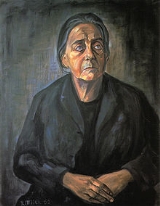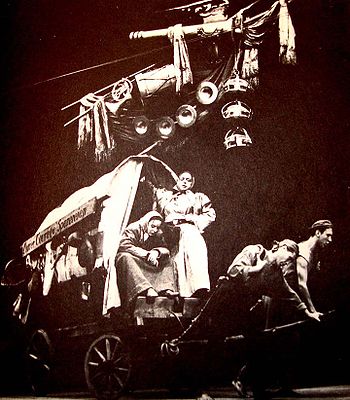
Therese Giehse
Encyclopedia
Therese Giehse born Therese Gift, was a distinguished German
actress. Born in Munich
to German-Jewish
parents, she first appeared on the stage in 1920. She became a major star on stage, in films, and in political cabaret. In the late 1920s through 1933, she was a leading actress at the famous Munich Kammerspiele
.
came to power in 1933, Giehse left Germany for Zürich
, Switzerland, where she continued to act in exile, playing leading roles in Zürich, including in Erika Mann
's acclaimed political cabaret
, the Pfeffermühle (which was itself also an exile, having been transported from Munich to Zürich in 1933 as well). During her exile, she traveled throughout central Europe with Pfeffermühle. On 20 May 1936 she married the homosexual English writer John Hampson
, in order to obtain a British passport and thereby avoid capture by the Nazis. She returned to Germany after World War II
, and performed in theatres on both sides of the Iron Curtain
, but mostly in her native Bavaria
, until her death in 1975.
 In exile, Giehse played the first Mother Courage
In exile, Giehse played the first Mother Courage
in the world premiere of Bertolt Brecht's play Mother Courage and Her Children
, in 1941 at the Schauspielhaus Zürich
.
After the war, Giehse returned to Munich and to the Munich Kammerspiele
, where, in 1950, she again played the role of Mother Courage, this time directed by Brecht himself. This production became documented as the second "Model production" of Brecht's play (the first "Model production" had been performed by Brecht's wife, Helene Weigel
in 1949 in Berlin
). Giehse and Brecht would often converse in their strong Bavarian (southern German) dialect during rehearsals, making Brecht's wife jealous of their kindred spirit.
In the 1950s, Giehse played several roles as a member of Brecht's theatre, the Berliner Ensemble
. In the mid 1970s, Therese Giehse returned to the Berliner Ensemble to perform several Brecht Evenings of the poems, plays, and writings of her lifelong friend and colleague, the late Bertolt Brecht. As a member of the Berliner Ensemble and collaborator with Brecht, she was a much-sought-after interpreter of his work and recordings of her reciting and singing his work appeared on records in both East and West Germany
.
_1988,_minr_825.jpg) Throughout the 1950s and 1960s, Giehse continued to perform many lead roles in various theatres in Germany, often using her considerable comic skills to play character roles, as well as great dramatic roles, such as the leads in several landmark productions by Friedrich Dürrenmatt
Throughout the 1950s and 1960s, Giehse continued to perform many lead roles in various theatres in Germany, often using her considerable comic skills to play character roles, as well as great dramatic roles, such as the leads in several landmark productions by Friedrich Dürrenmatt
, the world premiere of The Visit
in 1956, and The Physicists in 1962. Later, she also worked with Peter Stein
's renowned Schaubühne am Halleschen Ufer in Berlin.
She also appeared in over 20 films and a number of television productions.
In 1988, a commemorative stamp was printed in her honour as part of the Women in German history series
.
Germany
Germany , officially the Federal Republic of Germany , is a federal parliamentary republic in Europe. The country consists of 16 states while the capital and largest city is Berlin. Germany covers an area of 357,021 km2 and has a largely temperate seasonal climate...
actress. Born in Munich
Munich
Munich The city's motto is "" . Before 2006, it was "Weltstadt mit Herz" . Its native name, , is derived from the Old High German Munichen, meaning "by the monks' place". The city's name derives from the monks of the Benedictine order who founded the city; hence the monk depicted on the city's coat...
to German-Jewish
Jews
The Jews , also known as the Jewish people, are a nation and ethnoreligious group originating in the Israelites or Hebrews of the Ancient Near East. The Jewish ethnicity, nationality, and religion are strongly interrelated, as Judaism is the traditional faith of the Jewish nation...
parents, she first appeared on the stage in 1920. She became a major star on stage, in films, and in political cabaret. In the late 1920s through 1933, she was a leading actress at the famous Munich Kammerspiele
Munich Kammerspiele
The Munich Kammerspiele is a successful German language theatre in Munich. The Schauspielhaus in the Maximilianstrasse is the major stage.-History:...
.
Early career
When the NazisNazism
Nazism, the common short form name of National Socialism was the ideology and practice of the Nazi Party and of Nazi Germany...
came to power in 1933, Giehse left Germany for Zürich
Zürich
Zurich is the largest city in Switzerland and the capital of the canton of Zurich. It is located in central Switzerland at the northwestern tip of Lake Zurich...
, Switzerland, where she continued to act in exile, playing leading roles in Zürich, including in Erika Mann
Erika Mann
Erika Julia Hedwig Mann was a German actress and writer, the eldest daughter of novelist Thomas Mann and Katia Mann.-Life:...
's acclaimed political cabaret
Cabaret
Cabaret is a form, or place, of entertainment featuring comedy, song, dance, and theatre, distinguished mainly by the performance venue: a restaurant or nightclub with a stage for performances and the audience sitting at tables watching the performance, as introduced by a master of ceremonies or...
, the Pfeffermühle (which was itself also an exile, having been transported from Munich to Zürich in 1933 as well). During her exile, she traveled throughout central Europe with Pfeffermühle. On 20 May 1936 she married the homosexual English writer John Hampson
John Hampson (novelist)
John Frederick Norman Hampson Simpson , who wrote as John Hampson, was an English novelist.Best known for his 1931 novel Saturday Night at the Greyhound - an unexpected critical and commercial success for the Hogarth Press - he was a member of the Birmingham Group of working class authors which...
, in order to obtain a British passport and thereby avoid capture by the Nazis. She returned to Germany after World War II
World War II
World War II, or the Second World War , was a global conflict lasting from 1939 to 1945, involving most of the world's nations—including all of the great powers—eventually forming two opposing military alliances: the Allies and the Axis...
, and performed in theatres on both sides of the Iron Curtain
Iron Curtain
The concept of the Iron Curtain symbolized the ideological fighting and physical boundary dividing Europe into two separate areas from the end of World War II in 1945 until the end of the Cold War in 1989...
, but mostly in her native Bavaria
Bavaria
Bavaria, formally the Free State of Bavaria is a state of Germany, located in the southeast of Germany. With an area of , it is the largest state by area, forming almost 20% of the total land area of Germany...
, until her death in 1975.
With Bertolt Brecht

Mother Courage
Mother Courage is a character from a Grimmelshausen novel Lebensbeschreibung der Ertzbetrügerin und Landstörtzerin Courasche dating from around 1670...
in the world premiere of Bertolt Brecht's play Mother Courage and Her Children
Mother Courage and Her Children
Mother Courage and Her Children is a play written in 1939 by the German dramatist and poet Bertolt Brecht with significant contributions from Margarete Steffin...
, in 1941 at the Schauspielhaus Zürich
Schauspielhaus Zürich
The Schauspielhaus Zürich is one of the most prominent and important theatres in the German-speaking world. It is also known as "Pfauenbühne" after its location on the Pfauen Square in Zürich, Switzerland. The large theatre has 750 seats...
.
After the war, Giehse returned to Munich and to the Munich Kammerspiele
Munich Kammerspiele
The Munich Kammerspiele is a successful German language theatre in Munich. The Schauspielhaus in the Maximilianstrasse is the major stage.-History:...
, where, in 1950, she again played the role of Mother Courage, this time directed by Brecht himself. This production became documented as the second "Model production" of Brecht's play (the first "Model production" had been performed by Brecht's wife, Helene Weigel
Helene Weigel
Helene Weigel was a distinguished German actress. She was the second wife of Bertolt Brecht, and together they had a son Stefan Brecht and daughter Barbara Brecht-Schall .The daughter of a Jewish lawyer, she became a Communist Party member from 1930 and Artistic Director of the...
in 1949 in Berlin
Berlin
Berlin is the capital city of Germany and is one of the 16 states of Germany. With a population of 3.45 million people, Berlin is Germany's largest city. It is the second most populous city proper and the seventh most populous urban area in the European Union...
). Giehse and Brecht would often converse in their strong Bavarian (southern German) dialect during rehearsals, making Brecht's wife jealous of their kindred spirit.
In the 1950s, Giehse played several roles as a member of Brecht's theatre, the Berliner Ensemble
Berliner Ensemble
The Berliner Ensemble is a German theatre company established by playwright Bertolt Brecht and his wife, Helene Weigel in January 1949 in East Berlin...
. In the mid 1970s, Therese Giehse returned to the Berliner Ensemble to perform several Brecht Evenings of the poems, plays, and writings of her lifelong friend and colleague, the late Bertolt Brecht. As a member of the Berliner Ensemble and collaborator with Brecht, she was a much-sought-after interpreter of his work and recordings of her reciting and singing his work appeared on records in both East and West Germany
West Germany
West Germany is the common English, but not official, name for the Federal Republic of Germany or FRG in the period between its creation in May 1949 to German reunification on 3 October 1990....
.
Other roles
_1988,_minr_825.jpg)
Friedrich Dürrenmatt
Friedrich Dürrenmatt was a Swiss author and dramatist. He was a proponent of epic theatre whose plays reflected the recent experiences of World War II. The politically active author's work included avant-garde dramas, philosophically deep crime novels, and often macabre satire...
, the world premiere of The Visit
The Visit
The Visit is a 1956 tragicomic play by Swiss dramatist Friedrich Dürrenmatt.-Plot summary:...
in 1956, and The Physicists in 1962. Later, she also worked with Peter Stein
Peter Stein
Peter Stein is a critically acclaimed German theatre and opera director who established himself at the Schaubühne am Lehniner Platz, a company that he brought to the forefront of German theatre....
's renowned Schaubühne am Halleschen Ufer in Berlin.
She also appeared in over 20 films and a number of television productions.
In 1988, a commemorative stamp was printed in her honour as part of the Women in German history series
Women in German history series
Women in German history is a definitive stamp series issued in the Federal Republic of Germany and West Berlin from 1986 to 1990, and in reunited Germany since 1990.-Description:...
.

